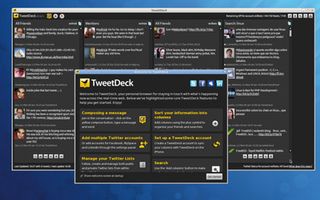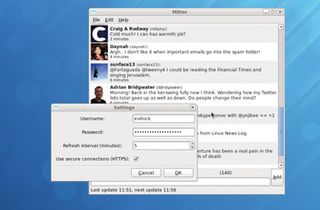8 of the best free Twitter clients for Linux
Fully-featured apps to keep on top of your tweets
6. TweetDeck - the popular cross-platform champion of Twitter clients
TweetDeck is second only to the standard web browser as the most popular way to update your status on the web, which means that it must have something going for it.
It appears on the Linux platform courtesy of the Adobe Air platform, which may take some of the gloss off it, both figuratively and literally for Linux users. The popularity, we can easily deduce, is down to the sheer number of features and ease of use.

TweetDeck not only posts images for you, for example, but it includes a drag-and-drop interface to do so. It will auto-shorten URLs with your service of choice, and automatically shrink your tweets as you enter them. Switch between multi-column or single-column view and add custom columns to deal with searches, groups or other accounts like Facebook.
For all that, there are things it doesn't do. There is no theming to speak of, both styles of the update notification are large and obtrusive, the icons are often just a little on the small side, and if you use Identica or Laconica, there's no way to add these servers.
There are other annoyances. One is that TweetDeck requires you to create an account on its website to enable the saved groups feature. This seems like a thinly veiled attempt to garner user data. There seems to be no indication of what data transfer occurs between the client or the website, and no EULA for the software either – the terms all refer to the website. Maybe this isn't a major consideration to most users.
All in all though, it has the best featureset of the clients on test here, by some margin. If you use Twitter a great deal, this is probably the best choice.
Version: 0.32.5
Website: www.tweetdeck.com
Price: Free, closed licence
Verdict: The most popular desktop client for good reason.
Rating: 9/10
7. Mitter - Python and GTK join forces to take on the Twitter world
This is another client that's flying the flag for lightweight and easy to use apps, and as such bears no small resemblance to Twitux. Also using GTK, though this time through the medium of Python, it's a multiplatform app (as long as you install a proper version of Python on OS X or Windows) which possibly accounts for some of its increased popularity.
Mitter currently eschews the more complex features demanded by the frequent-posting twitterati, but isn't quite as pared to the bone as other clients. While you don't get a choice in the service it uses, it does support URL shortening, for instance.

There is no transparent decoding of short URLs, nor are they directly clickable, but right-clicking on a tweet does give the option to follow any links, which will open in your default browser.
As for customisation, well, there isn't any. The settings menu allows you to enter your Twitter account details, and that's it – no changing the font, no theming, no nothing. All this makes it a little less understandable that it requires so much memory to run, though this is mostly from the libraries it loads.
Disappointingly, and for whatever reason, it also appeared to be the most likely, among those tested, to go into random freezes, failed uploads and general misbehaviour. The version on test is, as always unless otherwise stated, the last stable release version, though there are test versions that address some of these issues.
Mitter doesn't have quite the same lightweight credentials as Twitux. After all, you'll still need to have Python and various libraries installed to use it. It does a similar job though, and at least has the prospect of features being added as time goes by.
Version: 0.4.5
Website: http://mitter.googlecode.com
Price: Free under GPL
Verdict: Mitter could do with trying just a little harder.
Rating: 4/10
8. Mixero - slightly quirky Adobe Air app
For some reason (chance? Magic? Good programming?) Mixero seems to suffer less from the Adobe Air effect. It seems at least to be more responsive and less prone to graphical glitches than the other Air apps on test. And it achieves all this without actually even claiming to support Linux at all!
A side-by-side view with controls in the middle is certainly a little quirky for Twitter clients, and yet after a few hours of use it seems quite natural. The left hand side shows the timeline, while the right is for user management and groups.

Mixero implements lists well, in a sort of directory tree structure inside the tabbed view, and it's really easy to amend them. These groups or lists can be managed separately by the application, or synchronised with your Twitter account. Twitter currently only allows 15 lists per user, so if you need more groups than that, you won't be able to sync them.
Although it doesn't explicitly support Identica, you can change the server address and therefore support any Twitter-compatible server. It's also possible to add multiple Twitter and Facebook accounts, although it becomes a little difficult to manage them effectively.
One neat solution to the growing amount of timeline noise is the ability to detach a new timeline window. As windows can be filtered, this means you can set up Mixero to scan for particular tags or whatever while still enjoying the normal timeline view.
Like Choqok, you'll get a decoded URL address if you hover over any shortened URL in the timeline, and it also sports some nifty translation features.
The interface might be a little fussy for some, and there isn't much available in the way of customisation, but it becomes deceptively easy to use after a short while. Definitely one to try before you make a final decision.
Version: 0.53.4
Website: www.mixero.com
Price: Free, closed licence
Verdict: The Twitter client for those who march to their own funky drum.
Rating: 8/10
Current page: 6-8: TweetDeck, Mitter and Mixero
Prev Page 3-5: Twitux, Gwibber and Choqok Next Page The verdictGet daily insight, inspiration and deals in your inbox
Get the hottest deals available in your inbox plus news, reviews, opinion, analysis and more from the TechRadar team.
